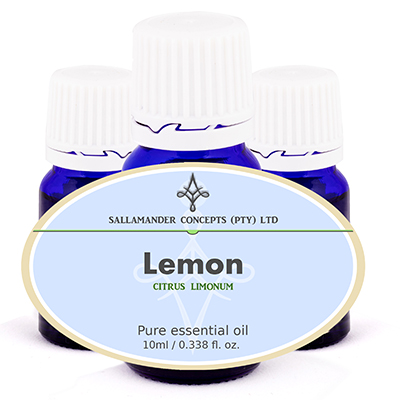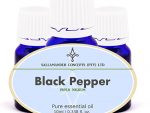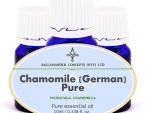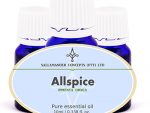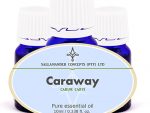Information on Lemon Essential Oil
Lemon Essential Oil can be very beneficial to the circulatory system and aids with blood flow, reducing blood pressure and helping with nosebleeds.
It can help bring down fever, helps relieve throat infections, bronchitis, asthma and flu. It boosts the immune system and cleanses the body, improves the functions of the digestive system, and it is helpful with constipation, dyspepsia and cellulite.
Lemon oil soothes and relieves headaches and migraines and is helpful for rheumatism and arthritis.
It is also used for clearing acne, cleaning greasy skin and hair, as well as removing dead skin cells, easing painful cold sores, mouth ulcers, herpes and insect bites.
Oil Properties
Lemon Essential Oil has a sharp, fresh smell, is pale greenish-yellow in color and is watery in viscosity. The shelf life of lemon oil is only 8-10 months, if it is to be used in aromatherapy, but can still be used in fragrance therapies after this time, such as vapor therapy.
Origin
A native of India, this evergreen tree grows up to about 6 meters (20 feet) and has dark green serrated oval leaves with pink/white flowers that are highly perfumed.
The trees have thorns and fruit that turn from green to yellow on ripening.
The name is derived from the Arabic ‘laimun’ or the Persian ‘limun’.
The tree was brought to Europe by the Crusaders in the Middle Ages and the fruit has a good content of vitamins A, B and C – an ounce a day was given to sailors in the Royal Navy to alleviate scurvy and other vitamin deficiencies.
In Japan, it is used in diffusers in banks to reduce worker-error and it is a popular flavoring agent for food and perfumes.
Extraction
Lemon Essential Oil is extracted from the fresh fruit peel by cold expression.
Chemical composition
The main chemical components of lemon oil are (+)-Limonene, β-Pinene, γ-Terpinene, α-Terpinol, α-Pinene, Geraniol
Therapeutic properties
The therapeutic properties of lemon oil are anti-anemic, antimicrobial, anti-rheumatic, anti-sclerotic, antiseptic, bactericidal, carminative, cicatrisant, depurative, diaphoretic, diuretic, febrifuge, haemostatic, hypotensive, insecticidal, rubefacient, tonic and vermifuge.
Precautions
Non-toxic, but can cause skin irritation and sensitizing in some individuals (specifically if oxidised). Since it is a photo-toxic oil, Caution should be taken that skin should not be exposed to the sun/UV rays/sun-bed after this essential oil has been applied at a high dilution rate.
As with most essential oils, this essential oil should be kept in a dark and cool place and should be stored in an airtight glass bottle (Preferably in the fridge at a temperature of around 4° Celsius / 39° Fahrenheit).
Please read our page with heading: Safety with Essential Oils before using this oil.
We recommend the following book as an excellent resource regarding safety:
Essential Oil Safety: A Guide for Health Care Professionals by Robert Tisserand & Rodney Young (#ad)
Uses
Lemon Essential Oil can be very beneficial to the circulatory system and aids with blood flow, reducing blood pressure and helping with nosebleeds.
It can help bring down fever, helps relieve throat infections, bronchitis, asthma and flu.
It boosts the immune system and cleanses the body, improves the functions of the digestive system, and it is helpful with constipation, dyspepsia and cellulite.
Lemon oil soothes and relieves headaches and migraines and is helpful for rheumatism and arthritis.
It is also used for clearing acne, cleaning greasy skin and hair, as well as removing dead skin cells, easing painful cold sores, mouth ulcers, herpes and insect bites.
Burners and vaporizers
In vapor therapy, lemon oil can be used for colds, voice loss, flu, depression, stress, lack of energy and fatigue.
It furthermore relieves irritation and also helps improve concentration, lifts the spirits, clears the mind and helps in decision making.
Blended Massage Oil or in the Bath
Lemon Essential Oil can be used in blended massage oils or diluted in the bath to assist with digestive problems, lack of energy, fatigue, infections, flu, obesity, overweight, rheumatism, depression, stress and as a general tonic.
Mouthwash or Gargle
If dispersed in a very diluted form in warm water, it can be great to use as a mouth wash to sort out mouth ulcers. Do not swallow and spit out.
Blended in a Cream
Lemon Essential Oil can be used in a cream or lotion to clear congested skin.
The astringent properties are great for oily skin conditions.
The antiseptic effect of lemon oil on the other hand, helps to treat any cuts, boils and minor wounds.
The rubefacient action of the oil further helps to sort out cellulite, as well as helping with acne.
Suggested Dilution Rates
On the skin
Adult:
Face: 0.5% to 1.5%
Body: 1.5% to 2%
Bath: 1.5% to 2%
3 to 24 months:
Face: 0.25% to 0.5%
Body: 0.25% to 0.5%
Bath: Maximum of 0.5%
2 to 6 years:
Face: 0.5% to 1%
Body: 0.5% to 1%
Bath: 0.5% to 1 %
6 to 15 years
Face: 0.5% to 1.5%
Body: 0.5% to 2%
Bath: 0.5% to 2%
Pregnancy
Face: 0.5% to 1.5%
Body: 0.5% to 2%
Bath: 0.5% to 2%
- When in doubt consult your doctor / medical professional before use.
- Most professionals and/or Aromatherapists will always err on the side of safety when giving advice regarding the use of essential oils and oleo resins during pregnancy.
- Quite a number of Aromatherapists advise that you should avoid all essential oils completely while pregnant, specifically during the first trimester. This is a very safe approach but may not be necessary at all.
Diffusers and Vaporisers
4 to 8 drops
General:
- When using for the first time – Always use the lowest dilution rate and build up slowly to the maximum. Stop using all essential oils on the skin if irritation or allergy occurs.
- Any advice or instruction received from a medical professional ALWAYS supersedes recommendations or advice found on this website. When in doubt consult your doctor / medical professional.
Summary
Lemon Essential Oil helps to fight against infections, aids the digestive system, soothes headaches, migraines and muscular problems and clears greasy skin and hair.
Blends
Although essential oils normally blend well with one another, Lemon oil blends particularly well with Lavender, Rose, Sandalwood, Benzoin, Eucalyptus, Geranium, Fennel, Juniper berry, Neroli and elemi.

